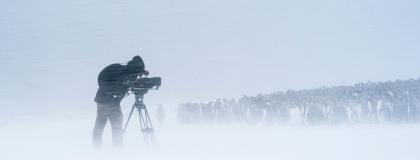
Guelph Grad Q&A: Ryan Tidman
How U of G Helped Award-Winning Wildlife Photographer and Cinematographer Follow their Passion
After Ryan Tidman graduated from the Environmental Sciences Program at the University of Guelph, he used the foundation it provided to pursue a career as a wildlife photographer and cinematographer.
His most recent accolades include having his photo selected as one of National Geographic's 2024 Pictures of the Year and working on the “Our Oceans” documentary, which is currently streaming on Netflix.
Continue reading to learn how the U of G helped Ryan land his dream job.
You can see some of Ryan’s incredible photography and work here.

Environmental Sciences provided a variety of different avenues to explore, allowing me to feel out different career paths. This allowed me to discover my strengths and interests and gave me a solid foundation to pursue a career that keeps me in the field, working on projects that contribute to environmental conservation.
Interview with Ryan Tidman
Tell us about yourself and why you chose to study Environmental Sciences at the University of Guelph?
What did you like most about your program? Is there anything in particular about the courses or professors that stands out to you?
Did you do co-op? If yes, tell us a bit about your co-op job and your experience.
Where are you currently working and what is your role?
How did your degree and time at the University of Guelph help get you to where you are today? How do the skills and education you gained help with your current work?
What advice would you give someone considering the Environmental Sciences program or applying to the University of Guelph?
Bonus Questions

Where was your favourite place to eat on campus and what was your go-to food order?
In your opinion where is the best place to study on campus?
What was your pre-exam ritual?
What are your top 5 favourite things about U of G?
- The Arboretum
- Student experience in South Residence
- Exploring all the parks around Guelph (Guelph Lake Conservation Area, Elora Gorge, etc.)
- Seeing the Cannon painted different colours each day
- Rutherford Conservatory and the Conservatory Garden